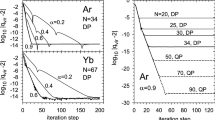Abstract
The exchange part of the usual Hartree-Fock potential in the unrestricted Hartree-Fock (UHF) theory is suitablyaveraged to construct an, average one-electron model Hamiltonian which generates a set of spin-restricted one-electron orbitals in a self-consistent manner. These orbitals are then used to calculate the electronic energy of the open-shell system by using the proper functional form for the energy which handles the exchange terms correctly. The eigenvalues ofF av can be used for calculating either the spin-polarised or spin-averaged ionisation potentials of different orbitals at theKoopmans’ theorem level of approximation. Comparison ofE ac with the UHF-energy shows thatE UHF<E ac in each case revealing some kind of an upper bound nature ofE ac. An approximate variational argument is given. Relationship of our model with the hyper-Hartree-Fock theory of slater is explored and the general problem of eliminating ‘self-interaction’ terms in average Fock-operator based theories is discussed.
Similar content being viewed by others
References
Al-Joubury M I and Turner D W 1964J. Chem. Soc. p 4434
Banerjee M and Bhattacharyya S P 1981aInt. J. Quant. Chem. (in press)
Banerjee M and Bhattacharyya S P 1981bJ. Phys. Chem. (Communicated)
Bhattacharyya S P 1980Proc. Indian Acad. Sci. (Chem. Sci.) 89 183
Bhattacharyya S P 1980J. Chem. Soc. (Dalton) p. 345
Bhattacharyya S P 1981Int. J. Quant. Chem. 19 735
Bhattacharyya S P and Chowdhury M 1977aJ. Phys.CChem. 81 1598, 1603
Dewar M J S, Harshmall J A and Venier C J 1968J. Am. Chem. Soc. 90 1953
Faegri Jr K and Manne R 1976Mol. Phys. 31 1037
Guest M F and Saunders V R 1974Mol. Phys. 28 1974
Gopinathan M S and Whitehead M A 1980Isr. J. Chem. 19 209
I’Haya Y 1964Adv. Quantum Chem. 1 203
Koopmans T 1933Physica, (S. Grav) 1 104
Nesbet R K 1955Proc. R. Soc. (London) A230 1955
Nesbet R K and Watson R E 1960Annals Phys. 9 1960
Pople J A and Nesbet R K 1954J. Chem. Phys. 22 571
Pople J A, Santry D P and Segal G A 1965J. Chem. Phys. 43 S129
Roothaan C C J 1960Rev. Mod. Phys. 32 179
Slater J C 1972Adv. Quantum Chem. 6 21
Slater J C 1974The self consistent field for molecules and solids (New York: McGraw-Hill) Vol. 4
Author information
Authors and Affiliations
Rights and permissions
About this article
Cite this article
Bhattachararyya, S.P., Chowdhury, M. An average fock operator technique of approximate open-shell LCAO-MO-SCF calculation. Proc. Indian Acad. Sci. (Chem. Sci.) 90, 391–405 (1981). https://doi.org/10.1007/BF02880851
Received:
Issue Date:
DOI: https://doi.org/10.1007/BF02880851



